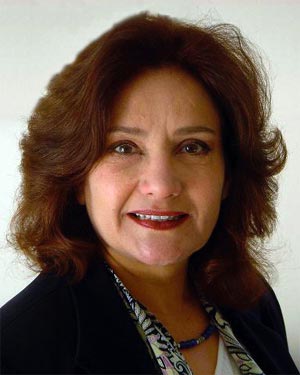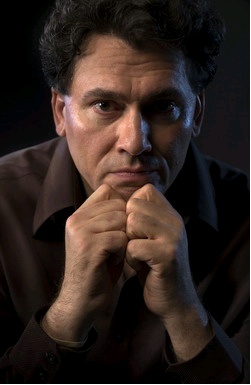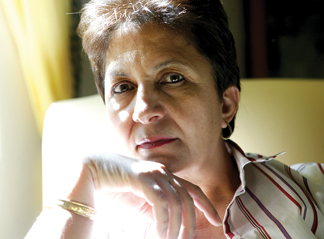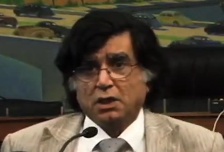Executive Board Members
Nonie Darwish
Jamal Jivanjee
Katrina-Cati Kaiser
Kamal Saleem
Wafa Sultan
Ibn Warraq
Advisory Board Members
Mohammed Ashgar
Mano Bakh
Cindy Dry
Naglaa El-Emam
Majed El-Shafie
Alamgir Hussein
M. A. Kahn
Mary Christina Love
Ali Sina
Patrick Sookhdeo
Executive Board Member Bios
Nonie Darwish: Director
 Nonie Darwish is an American human rights activist, writer, public speaker and founder of Arabs For Israel. She is the author of the book Now they Call Me Infidel: Why I Renounced Jihad for America, Israel and the War on Terror. Her second book is Cruel And Usual Punishment: The Terrifying Global Implications of Islamic Law. Her speech topics cover human rights, with an emphasis on women’s’ rights and minority rights in the Middle East.
Nonie Darwish is an American human rights activist, writer, public speaker and founder of Arabs For Israel. She is the author of the book Now they Call Me Infidel: Why I Renounced Jihad for America, Israel and the War on Terror. Her second book is Cruel And Usual Punishment: The Terrifying Global Implications of Islamic Law. Her speech topics cover human rights, with an emphasis on women’s’ rights and minority rights in the Middle East.
Born in Egypt, Darwish is the daughter of an Egyptian Army Lieutenant General, who, when assassinated by the Israeli army in 1956, was called a “shahid” by the Egyptian president Gamal Abdel Nasser, although Darwish blames “the Middle Eastern Islamic culture and the propaganda of hatred taught to children from birth” for the assassination. In 1978, she moved with her husband to the United States, and converted to Christianity there. After September 11, 2001 she has written on Islam-related topics.
Born in Cairo, Egypt, Darwish moved to Gaza in the 1950’s when her father, Lt. General Mustafa Hafez, was sent by Gamal Abdel Nasser to serve as commander of the Egyptian Army Intelligence in Gaza, which was under supervision of Egypt. Hafez founded the fedayeen who launched raids across Israel’s southern border, that between 1951 and 1956, killed some 400 Israelis. In July 1956 when Nonie was eight years old, her father became the first targeted assassination carried out by the Israeli Defense Forces in response the fedayeen’s attacks, making him a shahid. During his speech announcing the nationalization of the Suez Canal, Nasser vowed that all of Egypt would take revenge for Hafez’s death. Darwish claims that Nasser asked her and her siblings, “Which one of you will avenge your father’s death by killing Jews?”
Darwish explains:
I always blamed Israel for my father’s death, because that’s what I was taught. I never looked at why Israel killed my father. They killed my father because the fedayeen were killing Israelis. They killed my father because when I was growing up, we had to recite poetry pledging jihad against Israel. We would have tears in our eyes, pledging that we wanted to die. I speak to people who think there was no terrorism against Israel before the ’67 war. How can they deny it? My father died in it.
After his death, her family moved back to Cairo, where she attended Catholic high school and then the American University in Cairo, earning a BA in Sociology/Anthropology. She then worked as an editor and translator for the Middle East News Agency, until emigrating to the United States in 1978 with her husband, ultimately receiving United States citizenship. After arriving in the U.S., she became a Christian and began attending a non-denominational evangelical church. About a year after the September 11, 2001 attacks, Darwish began writing columns critical of Islamic extremism and the silence of moderate Muslims.
After 9/11 very few Americans of Arab and Muslim origin spoke out and from my experience it took us a long time to get noticed by Western media. Western media still regards Muslim organizations such as CAIR as representative of moderate Muslims in America. This is not the case. Muslim groups in the U.S. try to silence us and intimidate American campuses who invite us to speak. I often tell Muslim students that Arab Americans who are speaking out against terrorism are not the problem, it’s the terrorists who are giving Islam a bad name. And what the West must do is ask the politically incorrect questions and we Americans of Arab and Muslim origin owe them honest answers.
Darwish’s Arabs for Israel website describes itself as an organization of Arabs and Muslims who “respect and support the State of Israel,” welcome a “peaceful and diverse Middle East,” reject “suicide/homicide terrorism as a form of Jihad,” and promote “constructive self-criticism and reform” in the Arab/Muslim world. She often says, “Just because I am pro-Israel does not mean I am anti-Arab, it’s just that my culture is in desperate need for reformation which must come from within.”
She has spoken on numerous college campuses including Harvard, Yale, Columbia, Princeton, Brown, Hebrew University in Jerusalem, Oxford, Cornell, UCLA, NYU, Virginia Tech, UC Berkeley and several others. She has also spoken on Capitol Hill, the House of Lords, and The European Parliament.
Kamal Saleem
 Kamal Saleem was born to a large Sunni Muslim family in the heart of the Middle East. Kamal was recruited by the Muslim Brotherhood at a very early age and completed his first mission to Israel at the age of seven. Kamal was also recruited by the Palestinian Liberation Organization (The PLO) and other radical Muslim groups. The many years of his terrorist training, resulted in Kamal mastering every form of offensive and defensive terrorist tactics.
Kamal Saleem was born to a large Sunni Muslim family in the heart of the Middle East. Kamal was recruited by the Muslim Brotherhood at a very early age and completed his first mission to Israel at the age of seven. Kamal was also recruited by the Palestinian Liberation Organization (The PLO) and other radical Muslim groups. The many years of his terrorist training, resulted in Kamal mastering every form of offensive and defensive terrorist tactics.
Kamal left his family and home in the Middle East as a young man to enter his mission field: the United States. He brought with him a tremendous passion to convert as many Christians and Jews as possible for the glory of Allah. He implemented his plan, and converted many people to Islam.
Radical Islam is the most clear and present danger to both Christians and Jews in the world as we know it today.
In 1985, Kamal’s world turned upside down when he was seriously injured in an automobile accident. A Christian man tended to Kamal at the accident scene, making sure he got the medical treatment he needed. Kamal’s orthopedic surgeon and physical therapist were also Christian men whom over a period of several months ministered the unconditional love of Jesus Christ to him as he recovered. The love and sacrificial giving of these men caused Kamal to cry out to the God of Abraham, Isaac and Jacob acknowledging his need for the Savior. Kamal has since become a man on a new mission, as an ambassador for the one true and living God, the great I Am, Jehovah God of the Bible.
Kamal has tremendous insight into today’s world situation and a wealth of knowledge concerning the true culture and agenda of Islam. He is well versed in both the Koran and the Holy Bible. He believes radical Islam is the most clear and present danger to both Christians and Jews in the world, as we know it today. Kamal carries a message from God to awaken the church through the truth, education, and relationships.
Kamal and his wife were married in 1990. They have three children and five grandchildren. In 1998 his local church ordained Kamal as a Minister of the Gospel of Jesus Christ. He currently teaches and speaks worldwide in churches, Jewish synagogues, Muslim communities, universities and high schools. He has also appeared worldwide on radio and television programs.
—————————-
The United States and Western Europe have recently been confronted with a reality that is quite honestly foreign. Islam is one of the fastest growing religions. Although the religion itself has been around for over 1400 years, its impact worldwide has only just begun. We, as the Christian community, have very little understanding of what is commonplace to over 1.2 billion people. The Muslim community and its newfound foothold in popular culture have inundated our culture, our media, and our universities. Christianity, as a community and a culture, has just now begun the difficult journey of understanding the people, the faith, and the history of a worldview that sees almost one-fifth of the world population dedicated to its teachings. When you hear Kamal Saleem speak, you will discover an individual who lived a life far different from what is stereotypically found in Western culture. Growing up in a Muslim country in a Muslim home, Kamal was raised in an environment we could not begin to understand. Motivated by his Muslim family teaching, Kamal entered an underground war at the age of seven, then moved to Western Europe and eventually the United States to teach and convert Christians and Jews to the Islamic faith. While on his journey, Kamal found what his soul always longed for from the ONE he had so vehemently opposed.
Wafa Sultan
 Wafa Sultan is an author and well known critic of Islam. Sultan trained as a psychiatrist in Syria and is a U.S. naturalized citizen.
Wafa Sultan is an author and well known critic of Islam. Sultan trained as a psychiatrist in Syria and is a U.S. naturalized citizen.
Sultan was born to an Alawi family in Baniyas, Syria. She emigrated to the United States in 1989, and is now a naturalized citizen. Sultan has become notable since the September 11, 2001 attacks for her participation in Middle East political debates, with Arabic essays that circulated widely and some television appearances on Al Jazeera and CNN.
On February 21, 2006, she took part in Al Jazeera’s weekly 45-minute discussion program “The Opposite Direction.” She spoke from Los Angeles, arguing with host Faisal al-Qassem and with Ibrahim Al-Khouli about Samuel P. Huntington’s “Clash of Civilizations” theory. A six minute composite video of her remarks was subtitled and widely circulated by MEMRI on blogs and through e-mail; The New York Times estimated that it has been seen at least one million times. In this video she criticised Muslims for treating non-Muslims differently, and for not recognizing the accomplishments of Jewish and other members of non-Muslim society while using their wealth and technology.
Sultan describes her thesis as witnessing “a battle between modernity and barbarism which Islam will lose.” It has brought her telephone threats, but also praise from reformers. Her comments, especially a pointed criticism that “no Jew has blown himself up in a German restaurant,” brought her an invitation to Jerusalem by the American Jewish Congress.
As a result of her public criticism of Islam, in 2008, Sheikh Yousef Al-Qaradhawi, head of the European Center for Fatwa and Research, issued an opinion regarding Sultan that resulted in her requiring security and going into hiding (view MEMRI transcript of Qaradawi’s fatwa here).
Sultan believes that “The trouble with Islam is deeply rooted in its teachings. Islam is not only a religion. Islam [is] also a political ideology that preaches violence and applies its agenda by force.” In a discussion with Ahmad bin Muhammad, she said: “It was these teachings that distorted this terrorist and killed his humanity.”
Sultan stated that she was shocked into secularism by the 1979 atrocities committed by Islamic extremists of the Muslim Brotherhood against innocent Syrian people, including the machine-gun assassination of her professor, Yusef al Yusef, an ophthalmologist renowned beyond Syria, in her classroom in front of her eyes at the University of Aleppo where she was a medical student. “They shot hundreds of bullets into him, shouting, “God is great!'” she said. “At that point, I lost my trust in their god and began to question all our teachings. It was the turning point of my life, and it has led me to this present point. I had to leave. I had to look for another god.”
In 2006 Wafa Sultan was named in Time Magazine in a list of 100 influential people in the world “whose power, talent or moral example is transforming the world.” Time stated that “Sultan’s influence flows from her willingness to express openly critical views on Islamic extremism that are widely shared but rarely aired by other Muslims.”
Sultan’s book, A God Who Hates: The Courageous Woman Who Inflamed the Muslim World Speaks Out Against the Evils of Radical Islam, was published in 2009.
Ibn Warraq
Ibn Warraq (born 1946) is the pen name of a secularist author of Pakistani origin and founder of the Institute for the Secularisation of Islamic Society, and a Senior Research Fellow at the Center for Inquiry focusing on Qur’anic criticism.
Warraq gathered world notice through his historiographies of the early centuries of the Islamic timeline and has published works which question mainstream conceptions of the period. He is the author of seven books, including Leaving Islam: Apostates Speak Out (2003), Why I Am Not a Muslim (1995), The Origins of the Koran (1998), Quest for the Historical Muhammad (2000), What the Koran Really Says (2002) and Defending the West: A Critique of Edward Said’s Orientalism (2007). He has also spoken at the United Nations “Victims of Jihad” conference organized by the International Humanist and Ethical Union alongside speakers such as Bat Ye’or, Ayaan Hirsi Ali, and Simon Deng.
Warraq was born in 1946 in Rajkot, British India, to Muslim parents who migrated to Pakistan after the partitioning of the British Indian Empire in 1947. He started his schooling at a local Madrasah in Pakistan where he learned to recite the Qur’an by heart. However, he also stated in an interview with the German magazine Der Spiegel in 2007 that, “Like the Ahmadi Qadianis he was taught by British scholars so that he has not been indoctrinated by religion but should rather steer people away from religion in order to replace their beliefs with Humanism.” His father eventually decided to send him to a boarding school in England, partly to circumvent a grandmother’s effort to push an exclusively religious education on his son at the local Madrasah. He never knew his mother. After having arrived in Britain, he only saw his father once more, when he was 14; his father died when he was 16. Warraq claims to have been “pathologically shy” for most of his youth.
By 19 he had moved to Scotland to pursue his education at the University of Edinburgh where he studied philosophy and Arabic with Islamic Studies scholar W. Montgomery Watt.
After the Rushdie affair took place, Warraq, being greatly taken by these events, began to write for the American secular humanist Free Inquiry Magazine on topics along the lines of “why I am not Muslim.”
Ibn Warraq continued his writing with several works examining the historiography of the Qur’an and Muhammad raising a great deal of controversy and creating a debacle in the Islamic community in the process. Other books treated secular humanist values among Muslims.
In 2005 Warraq spent several months working with Christoph Luxenberg.
In February 2006 he participated with several other specialists at the Pim Fortuyn Memorial Conference on Islam in The Hague (February 17th-19th 2006).
In March 2006 a letter he co-signed entitled “MANIFESTO: Together facing the new totalitarianism,” with eleven other individuals (most notably Salman Rushdie) was published in response to violent and deadly protests in the Islamic world surrounding the Jyllands-Posten Muhammad cartoons controversy.
He is the founder of the Institute for the Secularisation of Islamic Society. In 2007 he participated in the St. Petersburg Secular Islam Summit along with other thinkers and reformers of Islam such as Ayaan Hirsi Ali, Wafa Sultan and Irshad Manji. The group released the St. Petersburg Declaration which urges world governments to, among other things, reject Sharia law, fatwa courts, clerical rule, and state-sanctioned religion in all their forms; oppose all penalties for blasphemy and apostasy, which they believe to be in accordance with Article 18 of the Universal Declaration of Human Rights.
Warraq’s op-ed pieces have appeared in The Wall Street Journal and The Guardian in London, and he has addressed governmental bodies all over the world, including the United Nations in Geneva.
In Oct 2007 Warraq participated in the IQ2 debates in London with Douglas Murray, David Aaronovitch, Tariq Ramadan, William Dalrymple, and Charles Glass.
Prior to 2007, Ibn Warraq refused to show his face in public. This was due to fears for his personal safety and also due to his desire to travel to see his family in Pakistan without being denied access to Muslim countries. His face was blacked out on the S.I.S.S. websites. More recently, he has decided to show his face openly and take part in public debates.
The pen name Ibn Warraq (Arabic: ابن وراق, most literally “son of a papermaker”) is used due to his concerns for his personal safety and one that has been adopted by dissident authors throughout the history of Islam. The name refers to 9th century skeptical scholar Muhammad al Warraq. Warraq adopted the pseudonym in 1995 when he completed his first book, entitled “Why I Am Not a Muslim.”









[…] Nonie Darwish is een schrijfster, voormalig redacteur en vertaler. Geboren en getogen in Egypte, woont ze al meer dan twee decennia in de VS. Nonie is onlangs begonnen met de arabsforisrael website. Ze is ook regelmatig uitgenodigd om te spreken op universiteiten en voor andere doelgroepen. […]